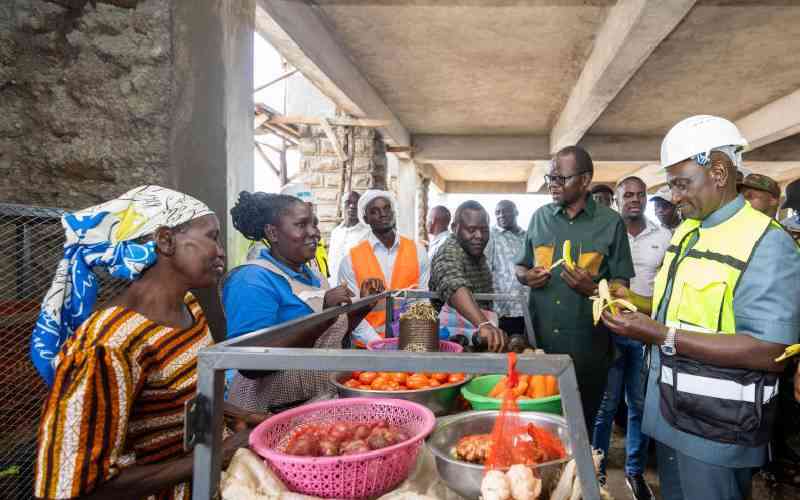African businesses including Kenya are losing hundreds of millions of dollars each year due to inefficient transit systems, a senior Afreximbank official said on Monday, urging small and medium enterprises (SMEs) to adopt a continental bond guarantee scheme to reduce trade risks and delays.
Dr Gainmore Zanamwe, Director of Trade Facilitation and Promotion at the African Export-Import Bank (Afreximbank), said the African Continental Free Trade Area (AfCFTA) Single Bond Guarantee Scheme offers a viable solution to long-standing logistical and financial barriers hampering intra-African trade.
Follow The Standard
channel
on WhatsApp
“We have seen cases where companies lose up to 60 cents of every dollar because of high transit costs and poor road networks. This is unsustainable if Africa wants to compete globally,” Zanamwe told delegates at a session on transit trade during the Intra-African Trade Fair (IATF2025) in Algiers.
The Single Bond Guarantee Scheme, developed in collaboration with the Common Market for Eastern and Southern Africa (COMESA) and other regional bodies, allows traders to use a single insurance-backed bond to move goods across multiple countries. This eliminates the need for separate costly guarantees or cash deposits at each border.
Zanamwe emphasised that the scheme is already showing success in pilot regions such as East Africa, (Kenya) where it has helped reduce transit times, lower costs, and improve competitiveness for local traders.
“What we are building is not meant to displace local banks or guarantee companies but to strengthen their ability to issue bonds affordably and at scale,” he said.
He called on African governments to harmonise customs procedures and provide regulatory backing for the scheme, while also encouraging regional economic communities to ensure interoperability between national systems.
Dr Benjamin Kamanga, Executive Director of ZEP-RE (PTA Reinsurance Company), which manages the regional insurance pool supporting the bond, said the scheme offers a cheaper alternative to bank guarantees or cash deposits traditionally required by customs authorities.
“Insurance, in our view, is the most meaningful and cheaper way of enabling trade while assuring revenue authorities that they will not lose revenue,” Kamanga said.
Afreximbank has provided $300 million to support the guarantee pool, ensuring sufficient capacity to cover high-value consignments.
Zanamwe concluded with a sense of urgency: “Our founding fathers envisaged efficient transit systems more than 60 years ago. We cannot wait any longer. The Single Bond Guarantee Scheme is the instrument that will make the AfCFTA real on the ground.”
A full rollout of the system across Africa could save the continent at least $300 million annually, with potential total savings reaching $1 billion by reducing delays, theft, and administrative burdens.
Follow The Standard
channel
on WhatsApp
Dr Gainmore Zanamwe, Director of Trade Facilitation and Promotion at the African Export-Import Bank (Afreximbank), said the African Continental Free Trade Area (AfCFTA) Single Bond Guarantee Scheme offers a viable solution to long-standing logistical and financial barriers hampering intra-African trade.
Follow The Standard
channel
on WhatsApp
“We have seen cases where companies lose up to 60 cents of every
dollar because of high transit costs
and poor road networks. This is unsustainable if Africa wants to compete globally,” Zanamwe told delegates at a session on transit trade during the Intra-African Trade Fair (IATF2025) in Algiers.
The Single Bond Guarantee Scheme, developed in collaboration with the Common Market for Eastern and Southern Africa (COMESA) and other regional bodies, allows traders to use a single insurance-backed bond to move goods across multiple countries. This eliminates the need for separate costly guarantees or cash deposits at each border.
Zanamwe emphasised that the scheme is already showing success in pilot regions such as East Africa, (Kenya) where it has helped reduce transit times, lower costs, and improve competitiveness for local traders.
He called on African governments to harmonise customs procedures and provide regulatory backing for the scheme, while also encouraging regional economic communities to ensure interoperability between national systems.
Dr Benjamin Kamanga, Executive Director of ZEP-RE (PTA Reinsurance Company),
which manages the regional insurance
pool supporting the bond, said the scheme offers a cheaper alternative to bank guarantees or cash deposits traditionally required by customs authorities.
“Insurance, in our view, is the most meaningful and cheaper way of enabling trade while assuring revenue authorities that they will not lose revenue,” Kamanga said.
Afreximbank has provided $300 million to support the guarantee pool, ensuring sufficient capacity to cover high-value consignments.
Zanamwe concluded with a sense of urgency: “Our founding fathers envisaged efficient transit systems more than 60 years ago. We cannot wait any longer. The Single Bond Guarantee Scheme is the instrument that will make the AfCFTA real on the ground.”
A full rollout of the system across Africa could save the continent at least $300 million annually, with potential total savings reaching $1 billion by reducing delays, theft, and administrative burdens.
Stay informed. Subscribe to our newsletter
Follow The Standard
channel
on WhatsApp
By Brian Ngugi


